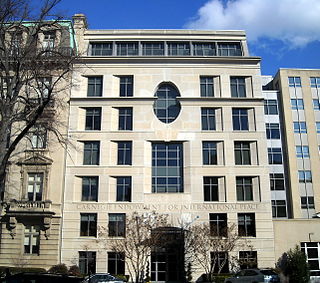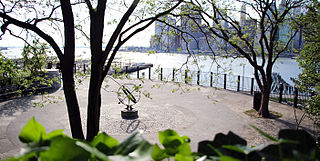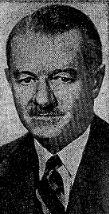The Ford Foundation is an American private foundation with the stated goal of advancing human welfare. Created in 1936 by Edsel Ford and his father Henry Ford, it was originally funded by a US$25,000 gift from Edsel Ford. By 1947, after the death of the two founders, the foundation owned 90% of the non-voting shares of the Ford Motor Company. Between 1955 and 1974, the foundation sold its Ford Motor Company holdings and now plays no role in the automobile company.
The Project for the New American Century (PNAC) was a neoconservative think tank based in Washington, D.C., that focused on United States foreign policy. It was established as a non-profit educational organization in 1997, and founded by William Kristol and Robert Kagan. PNAC's stated goal was "to promote American global leadership". The organization stated that "American leadership is good both for America and for the world", and sought to build support for "a Reaganite policy of military strength and moral clarity".

The Council on Foreign Relations (CFR) is an American think tank specializing in U.S. foreign policy and international relations. Founded in 1921, it is an independent and nonpartisan nonprofit organization. CFR is based in New York City, with an additional office in Washington, D.C. Its membership has included senior politicians, numerous secretaries of state, CIA directors, bankers, lawyers, professors, corporate directors and CEOs, and senior media figures.
Philanthropy is a form of altruism that consists of "private initiatives for the public good, focusing on quality of life". Philanthropy contrasts with business initiatives, which are private initiatives for private good, focusing on material gain; and with government endeavors that are public initiatives for public good, such as those that focus on the provision of public services. A person who practices philanthropy is a philanthropist.

In the United States, White Anglo-Saxon Protestants (WASP) is a sociological term which is often used to describe white Protestant Americans of Northwestern European descent, who are generally part of the white dominant culture or upper-class and historically often the Mainline Protestant elite. Historically or most consistently, WASPs are of British descent, though the definition of WASP varies in this respect. WASPs have dominated American society, culture, and politics for most of the history of the United States. Critics have disparaged them as "The Establishment". Although the social influence of wealthy WASPs has declined since the 1960s, the group continues to play a central role in American finance, politics, and philanthropy.

The Rockefeller Foundation is an American private foundation and philanthropic medical research and arts funding organization based at 420 Fifth Avenue, New York City. The second-oldest major philanthropic institution in America, after the Carnegie Corporation, the foundation was ranked as the 39th largest U.S. foundation by total giving as of 2015. By the end of 2016, assets were tallied at $4.1 billion, with annual grants of $173 million. According to the OECD, the foundation provided US$283.9 million for development in 2021. The foundation has given more than $14 billion in current dollars.

The Carnegie Endowment for International Peace (CEIP) is a nonpartisan international affairs think tank headquartered in Washington, D.C., with operations in Europe, South and East Asia, and the Middle East as well as the United States. Founded in 1910 by Andrew Carnegie, the organization describes itself as being dedicated to advancing cooperation between countries, reducing global conflict, and promoting active international engagement between the United States and countries around the world. It engages leaders from multiple sectors and across the political spectrum.

Stephen Anthony Cambone was the first United States Under Secretary of Defense for Intelligence, a post created in March 2003. Cambone first came to the attention of the public at large during the testimony of Major General Antonio Taguba before the U.S. Senate Armed Services Committee, where he disputed the General's statement that prison guards were under the effective control of military intelligence personnel and interrogators. Cambone resigned at the beginning of 2007 and was replaced by James R. Clapper, Jr., former head of the Defense Intelligence Agency (DIA) and the National Geospatial-Intelligence Agency. Cambone was associated with the Project for the New American Century, participating in the study which resulted in the writing of the report Rebuilding America's Defenses.

David Rockefeller was an American economist and investment banker who served as chairman and chief executive of Chase Manhattan Corporation. He was the oldest living member of the third generation of the Rockefeller family, and family patriarch from 2004 until his death in 2017. Rockefeller was the fifth son and youngest child of John D. Rockefeller Jr. and Abby Aldrich Rockefeller, and a grandson of John D. Rockefeller and Laura Spelman Rockefeller.

The Carnegie Corporation of New York is a philanthropic fund established by Andrew Carnegie in 1911 to support education programs across the United States, and later the world.
The Institute of Pacific Relations (IPR) was an international NGO established in 1925 to provide a forum for discussion of problems and relations between nations of the Pacific Rim. The International Secretariat, the center of most IPR activity over the years, consisted of professional staff members who recommended policy to the Pacific Council and administered the international program. The various national councils were responsible for national, regional and local programming. Most participants were members of the business and academic communities in their respective countries. Funding came largely from businesses and philanthropies, especially the Rockefeller Foundation. IPR international headquarters were in Honolulu until the early 1930s when they were moved to New York and the American Council emerged as the dominant national council.
Michael Mandelbaum is a professor and director of the American Foreign Policy program at the Johns Hopkins University, School of Advanced International Studies. He has written a number of books on American foreign policy and edited a dozen more.

The Social Science Research Council (SSRC) is a US-based, independent, international nonprofit organization dedicated to advancing research in the social sciences and related disciplines. Established in Manhattan in 1923, it maintains a headquarters in Brooklyn Heights with a staff of approximately 70, and small regional offices in other parts of the world.

Walter Russell Mead is an American academic. He is the James Clarke Chace Professor of Foreign Affairs and Humanities at Bard College and taught American foreign policy at Yale University. He was also the editor-at-large of The American Interest magazine. Mead is a columnist for The Wall Street Journal, a scholar at the Hudson Institute, and a book reviewer for Foreign Affairs, the quarterly foreign policy journal published by the Council on Foreign Relations.
Gary James Schmitt is an American political scientist who is a senior fellow at the American Enterprise Institute.
The Center of International Studies (CIS) was a research center that was part of Princeton University's Woodrow Wilson School of Public and International Affairs in Princeton, New Jersey. It was founded in 1951 by six scholars who came to Princeton from Yale Institute of International Studies under the leadership of the center's first director, Frederick S. Dunn. By 1999, its stated mission was to "promote world peace and mutual understanding among nations by supporting scholarship in international relations and national development" and to "support analysis of abiding questions in international security and political economy". In 2003, the center was merged with the university's regional studies programs to form the considerably larger Princeton Institute for International and Regional Studies.

Arnold Oscar Wolfers was a Swiss-American lawyer, economist, historian, and international relations scholar, most known for his work at Yale University and for being a pioneer of classical international relations realism.
The Yale Institute of International Studies was a research institute that was part of Yale University in New Haven, Connecticut. It was founded in 1935 and was led by directors Nicholas J. Spykman and later Frederick S. Dunn, under whom there was also an associate director, William T. R. Fox. The institute was influential in the development of international relations theory; in particular, it was considered a bastion of international relations realism. The institute came to an end in 1951 due to a conflict with the university administration. Dunn and five of his colleagues left Yale and formed a successor organization, the Center of International Studies, at Princeton University that same year.

Frederick Sherwood Dunn was an American scholar of international law and international relations. After working as a legal officer at the U.S. Department of State, he went into academia and taught at Johns Hopkins University, Yale University, and Princeton University, publishing several books during his career.
Ebenezer Babatunde Obadare is a Nigerian-American academic. He is the Douglas Dillon Senior Fellow for Africa Studies at the Council on Foreign Relations in Washington DC. Until 2021, he was a professor of Sociology at the University of Kansas, Lawrence, Kansas, United States. Obadare is a scholar of civil society, social change, religion in politics, and international relations.









